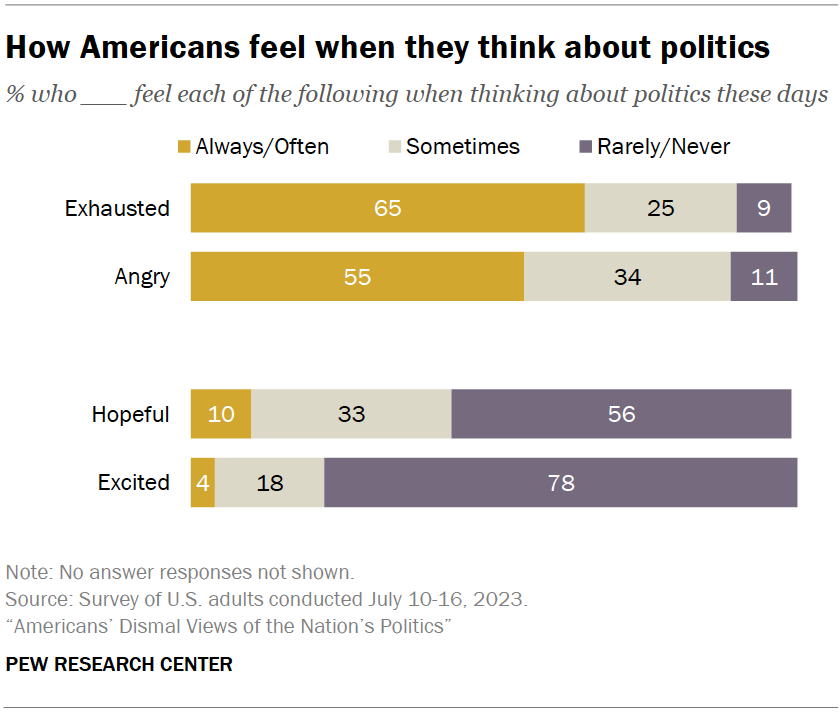Weekly Grounding #19
News, links, writing
Weekly Groundings are published every Friday to highlight the most interesting news, links, and writing I investigated during the past week. They are designed to ground your thinking in the midst of media overload and contribute to Handful of Earth’s broader mission. Please subscribe if you’d like to receive these posts directly in your inbox.
Without further ado, here’s this week’s Weekly Grounding:
“Americans’ Dismal Views of the Nation’s Politics”
This Pew Research Center report chronicles the systemic crisis in contemporary American politics: “A comprehensive new Pew Research Center study of the state of the nation’s politics finds no single focal point for the public’s dissatisfaction. There is widespread criticism of the three branches of government, both political parties, as well as political leaders and candidates for office.” The report continues: “Americans’ unhappiness with politics comes at a time of historically high levels of voter turnout in national elections. The elections of 2018, 2020 and 2022 were three of the highest-turnout U.S. elections of their respective types in decades. But voting in elections is very different from being satisfied with the state of politics – and the public is deeply dissatisfied.” The following chart demonstrates this point clearly:
“The Chris Hedges Report Podcast with Former Financial Times Reporter Matt Kennard About His Book Silent Coup: How Corporations Overthrew Democracy”
This interview on
with journalist Matt Kennard provides some important background for the results of the Pew report. Notably, Kennard discusses the “boomerang effect” in the global political-economic order in which corporate tactics previously reserved for the “Global South” are now deployed in wealthy Western nations: “The developed world has joined the race to the bottom and is basically finding any way to sell off the few remaining things it has to corporations.” The boomerang effect is a topic I’ve written about here at Handful of Earth in my essay, “Ted Kaczynski and the Paradox of the Postwar Predicament.”
“Following Layoffs, Boston University Announces ‘Inquiry’ into Ibram Kendi’s Antiracist Center”
The opportunism of many nominally non-electoral political movements is another contributing factor to “dismal views” of American politics. The Boston Globe reports on the alleged mismanagement of funds at Ibram X. Kendi’s Center for Antiracist Research at Boston University. The Center, which was funded heavily in the wake of the 2020 Black Lives Matter movement, recently laid off more than half of its staff and has faced scrutiny over its grant management practices: “‘I don’t know where the money is,’ said Saida Grundy, a BU professor who worked at the center from fall 2020 to spring 2021. In December 2021, Grundy sent an email to BU provost Jean Morrison alleging dysfunction in the organization and a ‘pattern of amassing grants without any commitment to producing the research obligated’ by them.”
“UAW-Automakers Negotiations Pit Falling Wages Against Skyrocketing CEO Pay”
Adam S. Hersh provides important context for the United Auto Workers strike at the Economic Policy Institute blog. This strike cannot be understood without grasping the far-reaching effects of the 2007-08 financial crisis on American autoworkers: “As unionized auto wages fell behind, so did non-unionized auto wages. This spillover effect whereby wage suppression of union workers filters out into the broader economy and damages the wages of non-union workers as well is a key dynamic driving U.S. inequality in recent years. Bureau of Labor Statistics data in Figure A [reproduced below] show that production and non-supervisory workers across the broader motor vehicle industry, union and non-union, have taken it on the chin since the 2009 deal. Those working in motor vehicle manufacturing saw their average hourly earnings fall a staggering 19.3% since 2008, after adjusting for inflation. Including the broader motor vehicle parts industries—where outsourcing strategies have long compressed industry wage structures and thus didn’t have as far to fall—average earnings fell 10% in real terms.”
“I’ve Always Loved Tech. Now, I’m a Luddite. You Should be One, Too”
In this opinion piece for The Washington Post, Los Angeles Times technology correspondent Brian Merchant dispels some common myths surrounding the original Luddite movement in nineteenth-century England: “The Luddites were not, contrary to popular belief, idiots who broke machines because they didn’t understand them. They were cloth workers who once led comfortable lives, working at home or in small shops, on their own terms and schedules, with freedom and dignity. When entrepreneurs tried to move their jobs into factories by using power looms and wide frames that did similar work faster, more cheaply and much more shoddily, the Luddites protested. These workers first sought compromise, dialogue and a democratic way to integrate new tech into their communities — to share in the gains. They were ignored. So they rebelled.” My own analysis of the Luddite movement can be found on Handful of Earth in “The Left’s Problem with Technology.”
“Sweden Brings More Books and Handwriting Practice Back to Its Tech-Heavy Schools”
Last week’s Weekly Grounding discussed the “edtech” movement in K-12 schooling. This Associated Press reporting on Sweden’s recent turn toward “printed books, quiet reading time and handwriting practice” demonstrates that the increased technologization of schooling is a choice, not an inevitability: “The return to more traditional ways of learning is a response to politicians and experts questioning whether the country’s hyper-digitalized approach to education, including the introduction of tablets in nursery schools, had led to a decline in basic skills.” The article continues: “In the Swedish capital, Stockholm, 9-year-old Liveon Palmer, a third grader at Djurgardsskolan elementary school, expressed his approval of spending more school hours offline. ‘I like writing more in school, like on paper, because it just feels better, you know,’ he told the AP during a recent visit.”
Kate Lindsay documents the collapse of dialogue and discussion on social media for
: The “idea—that we can safely expect to insulate ourselves from responses to our posts, even on close friends, a feature that was designed for sharing only with people you presumably trust and feel comfortable with—is indicative of how rapidly the social media environment has changed in the just three years. We’re all just throwing up billboards now. Unless we’re the ones passively viewing the billboards. In other words, lurkers.” She traces this trend back to the social media industry’s race to mimic TikTok, a platform where algorithmic discovery trumps peer-to-peer conversation. Certainly the censorship and general degradation of online discourse during the Trump years—coupled with the pandemic—also contributed to this trend. Lindsay perceptively observes that “We’re growing silent, lurking, sitting in these digital rooms out of habit, and not because we really want to be there.” This phenomenon in social media seems to parallel the paradoxical rise of voter turnout in tandem with voter disillusionment in politics. In both cases, participation does not entail satisfaction.
What grounded your thinking this week? Feel free to share in the comments.




